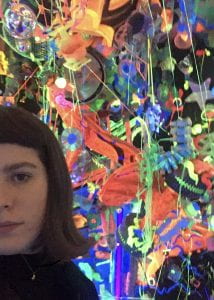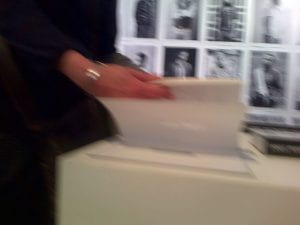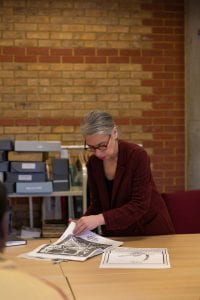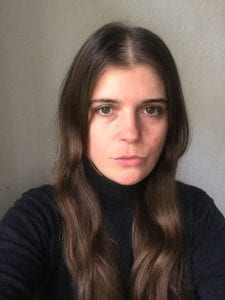Professor Patrizia di Bello
 Patrizia Di Bello is Professor of History and Theory of Photography at Birkbeck, University of London, where she co-directs the History and Theory of Photography Research Centre and, with students and colleagues inside and out of the University, looks after the Jo Spence Memorial Library Archive.
Patrizia Di Bello is Professor of History and Theory of Photography at Birkbeck, University of London, where she co-directs the History and Theory of Photography Research Centre and, with students and colleagues inside and out of the University, looks after the Jo Spence Memorial Library Archive.
She is the editor-in-chief of the journal History of Photography. Her most recent publication is ‘Carlyle like a rough block of Michael Angelo’s’: Thinking Photography through Sculpture in Julia Margaret Cameron’s Portraits’ in Photography and the Art: Essays on Nineteenth-century Practices and Debates, edited by Juliet Hacking and Joanne Lukitsh (Bloomsbury 2020), pp.115-127. Books include Sculptural Photographs from The Calotype to Digital Technologies (Bloomsbury 2017), The Photobook from Talbot to Ruscha (IB Tauris, 2012), edited with Colette Wilson and Shamoon Zamir, and Women’s Albums and Photography in Victorian Britain: Ladies, Mothers and Flirts (Ashgate 2007).
Tom Bilson
Head of Digital Media, Courtauld Institute of Art, London.
Beth Bramich
Beth Bramich is a postgraduate researcher in the Sociology Department at Goldsmiths, University of London, where she is currently developing a PhD project on feminist film collectives. She holds an MA in Critical Writing in Art and Design from the Royal College of Art and a BA from Nottingham Trent University.
Beth has contributed to Art Monthly, Frieze and Afterall Online, and regularly collaborates with artists on films, exhibitions, events and publications. She teaches on art programmes at the University of the Arts London; is a member of the research network Group Work: Contemporary Art and Feminism; part of the working group of the Feminist Duration Reading Group; and is a cultural tenant with Flatness, a platform for artists’ moving image and network culture, at Studio Voltaire.
HATTY nestor
Hatty Nestor is researching the memorialisation, fetishisation and legacy of Cuban artist Ana Mendieta as part of her AHRC-funded PhD at Birkbeck, University of London. She has taught and run writing workshops at a number of Universities including Glasgow School of Art, The Sandberg Instituut and The Royal College of Art. She runs the Queer Feminist Archival Network with Lily Evans-Hill and is an associate fellow of the SHaME Network.
Her writing has been supported by the Arts Council and appears in Frieze, Art in America, The Times Literary Supplement, Granta, The White Review, and other publications. She has been writer-in-residence at the Jerwood Space in London (2017), critic-in-residence at Studio Das Weisse Haus in Vienna (2019) and will be completing a writing residency at Cove Park in 2023. Both her poetry pamphlet The Aching Poem (Boise State Press), and Ethical Portraits (Zero Books), were published in 2021.
Lily Evans-Hill
 Lily Evans-Hill is a postgraduate researcher in the Art Department at Goldsmiths, University of London. She holds an MA from University College London and a BA from the Courtauld Institute of Art.
Lily Evans-Hill is a postgraduate researcher in the Art Department at Goldsmiths, University of London. She holds an MA from University College London and a BA from the Courtauld Institute of Art.
Her research focuses on the politics of collaboration in feminist art. Looking at the UK, and the period of intense feminist cultural production (1970s and 1980s), Lily’s research traces the connections between feminist organisational practices (for instance: small group work, consciousness-raising and workshop formats) and feminist art practice. The Women Artist’s Slide Library (now the Women’s Art Library at Goldsmiths) is both a case study and the principle archival resource for her research.
Lily is a working group member of the Feminist Duration Reading Group and Group Work Network. She convenes the Feminist and Queer Archives Research Network with Hatty Nestor. Her research is funded by CHASE/AHRC.
Dr Catherine Grant
 Catherine Grant is Reader in Modern and Contemporary Art at the Courtauld Institute. Until 2022, she was Senior Lecturer in the Art and Visual Cultures Departments at Goldsmiths, University of London.
Catherine Grant is Reader in Modern and Contemporary Art at the Courtauld Institute. Until 2022, she was Senior Lecturer in the Art and Visual Cultures Departments at Goldsmiths, University of London.
She is currently working on the re-enactment of feminist histories in contemporary art. Drawing on thinking about temporalities and history-making from queer and feminist theorists, as well as the construction of ‘the contemporary’ and ‘contemporary art’ in philosophy and art history, she has written a number of essays that explore strategies of re-enactment, re-writing and community-building across temporal divides. These include the essays “Fans of Feminism: re-writing histories of second-wave feminism in contemporary art” and “A Time of One’s Own” in the Oxford Art Journal.
She is the co-editor of Fandom as Methodology with Kate Random Love (2019), as well as the collections Girls! Girls! Girls! (2011) and Creative Writing and Art History (2012). She is a co-founder of the research network “Group Work: Contemporary Art and Feminism”, along with Dr Amy Tobin and Dr Rachel Warriner. Other publications and projects can be found on her GRO profile or Courtauld staff page.
Dr Althea Greenan
 Dr Althea Greenan works in Special Collections and Archives at Goldsmiths University of London curating the Women’s Art Library collection.
Dr Althea Greenan works in Special Collections and Archives at Goldsmiths University of London curating the Women’s Art Library collection.
Her work with the collection began in 1989 as a volunteer with the Women Artists Slide Library, the artists’ organization that became the Women’s Art Library in 1993. She remained with the collection when it was gifted to the Library at Goldsmiths University of London, and now works with artists and academic researchers to help realise new art and curatorial projects that develop alongside the collection.
She has written on the work of women artists since the 1980s publishing reviews, interviews and creative pieces in a range of publications from art magazines to academic journals. Her recent doctoral research focused on the WAL slide collection and aspects of digitization to ask: What can an artists’ slide collection do besides represent artwork? Her findings recover the text produced by slide-making and the feminist net-work that the slide collection continues to reproduce today.
Alexandra Symons Sutcliffe
 Alexandra Symons Sutcliffe is a curator, writer, and PhD candidate in the History of Art Department at Birkbeck University, where she works on British portrait and documentary photography of the 1970s and ‘80s. She has curated exhibitions and programs internationally, including at The Kitchen (New York), Gallery 44 (Toronto), Jupiter Woods (London), and PS120 (Berlin.) Her writing has appeared in Art Forum, Art Monthly, Border Crossings, and Texte Zur Kunst.
Alexandra Symons Sutcliffe is a curator, writer, and PhD candidate in the History of Art Department at Birkbeck University, where she works on British portrait and documentary photography of the 1970s and ‘80s. She has curated exhibitions and programs internationally, including at The Kitchen (New York), Gallery 44 (Toronto), Jupiter Woods (London), and PS120 (Berlin.) Her writing has appeared in Art Forum, Art Monthly, Border Crossings, and Texte Zur Kunst.
